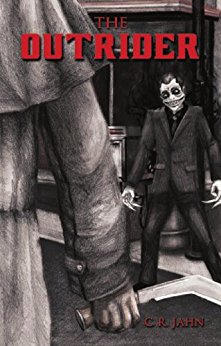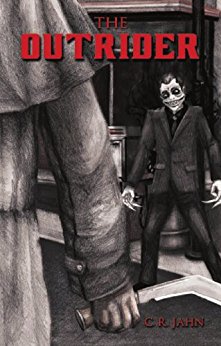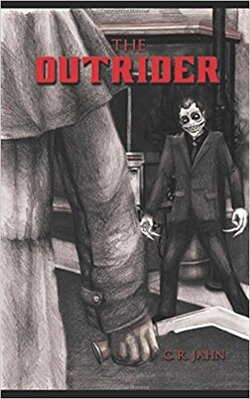This will be unlike anything you’ve ever read.
Supposedly, my book belongs in some subgenre of dark urban fantasy, but there are no vampires or elves here, no paranormal romance, and certainly no whimsy. Indeed, the core theme seems to be bleakness and despair, with a plot involving demonic possession on a mass scale, targeting Denver’s street people, transforming them into a covert paramilitary force in preparation for some unknown objective. Perhaps it would be best to think of it as magickal realism with a hard edge, similar to noir. I anticipate poor reviews simply due to the tone and subject matter.
The concept of “perfect possession,” as elucidated by Malachi Martin in Hostage to the Devil, resonated with me, as it rang true with my own personal observations of functional psychopaths who seemed to be either psychically gifted or exceptionally lucky. Sara Gran’s fictional depiction of the demonic in Come Closer also proved a strong influence, as well as Thomas Ligotti’s dreamlike tales of an inescapable supernatural malevolence.
I spoke with a number of clairvoyants about their experiences interacting with the demonic, and one commonality was the illusion of dramatic facial change, like a ghostly mask appearing over the face of the possessed. Hundreds of personal accounts, both modern and centuries old, speak of several distinct demonic races, and describe the physical and mental effects of having such an entity focus its attention on you. The way I’ve chosen to depict the demonic in this fictional work stays fairly true to that research, although of course I have indulged in a number of artistic liberties.
The mysterious and seemingly contradictory nature of the demonic is confusing. By extension, many aspects of this story may also seem confusing. The protagonist only sees part of the puzzle, as the spirits he interacts with choose to keep much concealed as they use him as a pawn towards their own ends. As a result, a great deal remains unexplained, which could at times be interpreted as “plot holes,” although upon a second reading it may make more sense.
Many of the characters are composites based upon individuals I’ve met, but none are modeled entirely on any one person. Most of the addresses and businesses are actual places here in Denver. Max’s does not exist (although there is a Conoco a few blocks away from where it should be) and the Temple’s address is a vacant lot, so don’t bother looking for either.
Angelo’s was a family run pizzeria which indeed made the best pizza in Denver, but sadly they recently sold to a young entrepreneur who destroyed the wood fired pizza oven in an effort to “modernize” and quality suffered accordingly. Smiley’s Discount Laundromat on Colfax also closed their doors while the story was being written. I elected not to change either location in the final draft, as both feature prominently herein.
Demonology is an interesting subject, especially when you take a non-denominational cross-cultural approach. I’ve studied it for over thirty years and make no pretense of understanding it, because it’s complex and multifaceted. Names, ranks, and correspondences seem largely subjective, if not irrelevant, but are included for artistic purposes as well as clarity. This book, in its entirety, is a work of fiction, and certainly not intended as any sort of theological or metaphysical treatise.
In many ways, Outrider is semi-autobiographical. The protagonist is an accurate reflection of my environment and mindset from a much earlier time in my life. Many of the dream sequences and flashbacks could've been pulled directly from my incinerated journals of that time. Half of this book was composed unconsciously, in a trance state, via automatic writing... I would sit down with my battered laptop and begin typing at double my usual rate, and hours later would face pages of text not written in my usual voice, with no typographical errors and words I was unfamiliar with and needed to look up in an antique unabridged dictionary. The experience nearly killed me. It will forever change the way you perceive the invisible world around you.
C. R. Jahn
Denver, Colorado
October, 2013.
"I found a depth and a truth in this work that I was not comfortable with... this was written by a man who understands the dark side of the street. The power that lies within the dark arts -- whether you choose to believe they are real or simply a mental construct for primitive people... the knowledge itself has ways of slipping in and out the cracks of your facade. It should come with a warning."
-- Seth Anderson Bailey, author of And The Rain Came Down
"A clash between inhuman forces of power too terrible to contemplate, in a world where humans are mere meatbag marionettes for ancient creatures with grudges older than civilization."
-- Thomas Pluck, author of Bad Boy Boogie
"It leaves fingerprints on you."
-- Cameron Rogers, author of The Music of Razors
AUDIOBOOK VERSION NARRATED BY GAGE RYAN MCCLEESE NOW AVAILABLE!!!!!
Supposedly, my book belongs in some subgenre of dark urban fantasy, but there are no vampires or elves here, no paranormal romance, and certainly no whimsy. Indeed, the core theme seems to be bleakness and despair, with a plot involving demonic possession on a mass scale, targeting Denver’s street people, transforming them into a covert paramilitary force in preparation for some unknown objective. Perhaps it would be best to think of it as magickal realism with a hard edge, similar to noir. I anticipate poor reviews simply due to the tone and subject matter.
The concept of “perfect possession,” as elucidated by Malachi Martin in Hostage to the Devil, resonated with me, as it rang true with my own personal observations of functional psychopaths who seemed to be either psychically gifted or exceptionally lucky. Sara Gran’s fictional depiction of the demonic in Come Closer also proved a strong influence, as well as Thomas Ligotti’s dreamlike tales of an inescapable supernatural malevolence.
I spoke with a number of clairvoyants about their experiences interacting with the demonic, and one commonality was the illusion of dramatic facial change, like a ghostly mask appearing over the face of the possessed. Hundreds of personal accounts, both modern and centuries old, speak of several distinct demonic races, and describe the physical and mental effects of having such an entity focus its attention on you. The way I’ve chosen to depict the demonic in this fictional work stays fairly true to that research, although of course I have indulged in a number of artistic liberties.
The mysterious and seemingly contradictory nature of the demonic is confusing. By extension, many aspects of this story may also seem confusing. The protagonist only sees part of the puzzle, as the spirits he interacts with choose to keep much concealed as they use him as a pawn towards their own ends. As a result, a great deal remains unexplained, which could at times be interpreted as “plot holes,” although upon a second reading it may make more sense.
Many of the characters are composites based upon individuals I’ve met, but none are modeled entirely on any one person. Most of the addresses and businesses are actual places here in Denver. Max’s does not exist (although there is a Conoco a few blocks away from where it should be) and the Temple’s address is a vacant lot, so don’t bother looking for either.
Angelo’s was a family run pizzeria which indeed made the best pizza in Denver, but sadly they recently sold to a young entrepreneur who destroyed the wood fired pizza oven in an effort to “modernize” and quality suffered accordingly. Smiley’s Discount Laundromat on Colfax also closed their doors while the story was being written. I elected not to change either location in the final draft, as both feature prominently herein.
Demonology is an interesting subject, especially when you take a non-denominational cross-cultural approach. I’ve studied it for over thirty years and make no pretense of understanding it, because it’s complex and multifaceted. Names, ranks, and correspondences seem largely subjective, if not irrelevant, but are included for artistic purposes as well as clarity. This book, in its entirety, is a work of fiction, and certainly not intended as any sort of theological or metaphysical treatise.
In many ways, Outrider is semi-autobiographical. The protagonist is an accurate reflection of my environment and mindset from a much earlier time in my life. Many of the dream sequences and flashbacks could've been pulled directly from my incinerated journals of that time. Half of this book was composed unconsciously, in a trance state, via automatic writing... I would sit down with my battered laptop and begin typing at double my usual rate, and hours later would face pages of text not written in my usual voice, with no typographical errors and words I was unfamiliar with and needed to look up in an antique unabridged dictionary. The experience nearly killed me. It will forever change the way you perceive the invisible world around you.
C. R. Jahn
Denver, Colorado
October, 2013.
"I found a depth and a truth in this work that I was not comfortable with... this was written by a man who understands the dark side of the street. The power that lies within the dark arts -- whether you choose to believe they are real or simply a mental construct for primitive people... the knowledge itself has ways of slipping in and out the cracks of your facade. It should come with a warning."
-- Seth Anderson Bailey, author of And The Rain Came Down
"A clash between inhuman forces of power too terrible to contemplate, in a world where humans are mere meatbag marionettes for ancient creatures with grudges older than civilization."
-- Thomas Pluck, author of Bad Boy Boogie
"It leaves fingerprints on you."
-- Cameron Rogers, author of The Music of Razors
AUDIOBOOK VERSION NARRATED BY GAGE RYAN MCCLEESE NOW AVAILABLE!!!!!

CLICK HERE TO READ THE FIRST 40 PAGES FREE!!!!!

CLICK HERE TO ORDER ON AMAZON!!!
Proudly powered by Weebly
